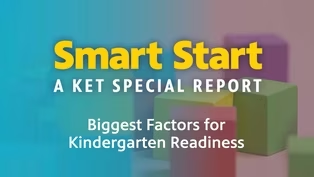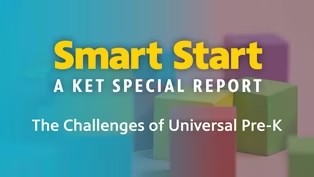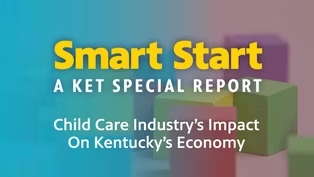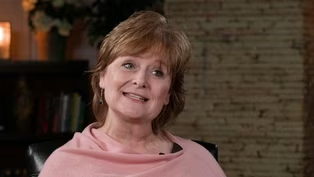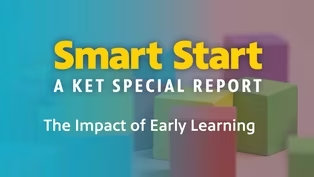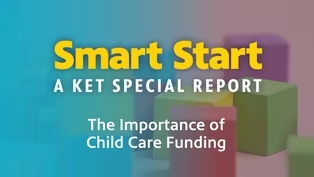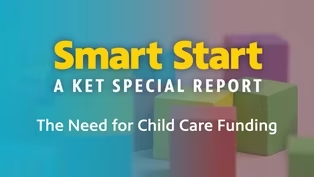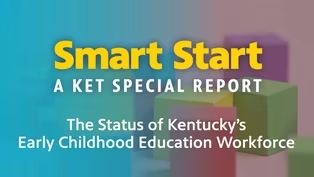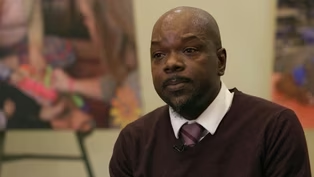Smart Start: A KET Special Report
Linda Smith (Full Interview)
Clip: Episode 1 | 27m 48sVideo has Closed Captions
Full Interview with Director of Early Childhood Initiative, Bipartisan Policy Center.
Full Interview with Linda Smith, Director of Early Childhood Initiative, Bipartisan Policy Center.
Problems playing video? | Closed Captioning Feedback
Problems playing video? | Closed Captioning Feedback
Smart Start: A KET Special Report is a local public television program presented by KET
Smart Start: A KET Special Report
Linda Smith (Full Interview)
Clip: Episode 1 | 27m 48sVideo has Closed Captions
Full Interview with Linda Smith, Director of Early Childhood Initiative, Bipartisan Policy Center.
Problems playing video? | Closed Captioning Feedback
How to Watch Smart Start: A KET Special Report
Smart Start: A KET Special Report is available to stream on pbs.org and the free PBS App, available on iPhone, Apple TV, Android TV, Android smartphones, Amazon Fire TV, Amazon Fire Tablet, Roku, Samsung Smart TV, and Vizio.
Providing Support for PBS.org
Learn Moreabout PBS online sponsorshipLinda Smith is director of Early Childhood Initiative at the Bipartisan Policy Center in Washington, D.C. She most recently served as the deputy assistant secretary for early Childhood Development in the Administration for Children and Families at the US Department of Health and Human Services.
Linda Smith, thank you so much for taking the time to share your expertise with us today.
I want to start off by just saying that your whole career and life's work has been in this early childhood development and care.
What is it about this age group, the first years of a child's life that inspires you and the work you do?
Well, I think it was my early years in working on a Native American reservation and seeing the impact that quality, early experiences can have on the development of children.
And it's just stuck with me.
How life changing the first few years of life really are.
So I think building on that, the early days of looking at Head Start and sort of where the countries come in, child care and early education programs, there's so much potential in this age group.
And you know, and it's just make it makes it easy to be committed to it.
Yes.
And so much potential.
You're right.
And a lot of the daycares and preschool that focus on those early on those first years, the business model is a tough one.
It's expensive for parents and caregivers.
And a lot of these centers run on a very tight budget.
And a lot of them wouldn't survive without federal and state funding, which means the taxpayers foot part of the bill.
So what is your best argument that this is worth the investment of taxpayer dollars to early childhood?
Well, I think we can see the the the the reason for this when we start looking at school readiness and kindergarten readiness and children who are coming to school unprepared and we can have a conversation about what that exactly means.
But to the point of child care, in particular in early learning across the board, I think what we we are in a dilemma in this country.
I think the COVID experience has demonstrated what so many of us who have worked in this field for a long time already knew, and that is that the business model is broken.
And the reason it is is because it simply, I say in the most simple terms, it costs more to produce a high quality child care program than parents can afford to pay.
It's that simple.
So when you have a business model where the product is more expensive than the audience, you know that consumes it, we need to do something.
And I think that's where the you know, what we some of the thinking that we have today is not that it's an either or, but that we need to have a shared responsibility.
It isn't up to either the parents or the government, for example, to do to do this.
But it's a shared responsibility in this country for for parents, for schools who benefit from the school readiness, from businesses, who benefit from parents, ability to go to work from the health care system, because the implications of health care for children in low quality care are significant.
So how do we get to a point where we understand that it's a shared responsibility and we need to fix that?
And I think that's what we've spent a lot of time working on that.
Yes.
And so you were saying, you know, this is worth the investment and you touched on a little bit of the high quality child care centers and how that impacts the health of the child, too, and impacts parents getting back to work.
Can you elaborate on that a little more?
What what are the argue and what are the arguments that this is worth the investment?
Well, I think we see in the business people like to talk about the return on investment.
And we've seen that return on investment over and over in this country.
There have been a number of studies in terms of the ROI that have looked at, you know, for every dollar spent, how many, $7, $13 are saved in other areas in terms of the economy.
The other thing we know is that the lack of care in this country has a significant, significant economic impact on on our country.
We have done been mapping the available ity of child care for parents against the potential need for several years now and in 35 states what we know to be the problem is we have essentially one one child care space for every two children who need it.
So we have a lot of children that we don't know where they are.
And so if we really believe that quality of care early in the early years matters, we're paying a price for those children being in less than quality situations.
I know we've talked a little better with we've thought a lot about, I should say, toxic stress.
And what does that do to children?
Well, that kind of toxic stress result results from situations where children are in neglect or either neglected, you know, in in in situations where they're not getting the adult child interactions that they need.
And so I think we pay a price on so many levels for not doing this.
I think it I mean, it just it's just common sense that we deal with this issue of quality and access.
Yes.
And you touched on a little bit of that toxic stress and how detrimental that can be to those early years and that brain development.
Can you expound on that a little bit?
And what are some of the solutions for that that you've seen on a national level?
Well, yes, toxic stress, essentially what that means is that, you know, there's a number of things that are factors.
And if you your audience is aware of the a study that's been been ongoing for years now from the Centers for Disease Control, toxic stress results from abuse, neglect, stressful situations, parent stress, etc., a lot of things contribute to toxic stress on children.
And there's a couple of things that really are important.
And when you talk about it, it's how consistent is this, the stress and how severe is that stress on children?
So what we we really know, though, is that these things can be worked with.
And the most important way we do that is working with the adults in the children's lives.
And so especially the caregivers in these children's lives, whether it's the parent or an adult caregiver, for example, in a child care center.
I'm going to skip ahead a little bit to one of the things that we know about the quality of care, and that is and it does relate back to the issue of toxic stress.
But one of the things that we know that the consistency and the quality of adult child interactions is the single biggest indicator of, you know, later child outcomes.
And so consistent in quality adult child interactions.
Two key words that our audience needs to understand how do we get that?
We get that.
My consistency, for example, in our workforce, in our childcare programs, which is a struggle right now, and we can talk more about that, but also in terms of the quality of the how these the caregivers, the teachers in childcare programs are prepared for the work.
And I think what we've got right now in our country is a problem with this, with a lot of turnover and churn in the early childhood workforce.
And what that means is we've got a lot of people coming into childcare, working in programs that they haven't had a lot of training or education or preparation to do.
And that then goes back to this issue of the stress and the the inconsistency that we see happening in our programs across the country.
But I do think that oftentimes we don't do enough in addressing what parents care about in this.
And parents are the key to all of it, really.
I mean, if you know that if we don't pay attention to what they want and need for their children, I think we're missing the boat.
Then what are what do we what do parents want and need?
What are you hearing?
Well, what we hear, you know, we've done now nine national surveys of parents to try and figure out what is it that parents really want when it comes to early childhood and childcare.
And I think that what we haven't built up for parents, first of all, the three things parents tell us they want and they're concerned about is first and foremost trust.
You want to trust the provider, whoever is taking care of their children.
That makes so much sense.
It's it's almost ridiculous to say it, but the trust is number one.
And number two is always health and then safety in parent.
Those things all stand to reason.
So what parents are looking for when they go out to find childcare and how are we how are we addressing those concerns as we in the early childhood community, I think, tend to think that we can give them an option and then they'll take it without considering what they're really asking us for.
So I think what we would need to do a better job of listening to parents, what do they need?
And then the child care system doesn't meet the needs of many parents in this country.
If you look at the hours of operation of child care programs, most child care centers almost all operate from 7 to 5 or maybe 630 to 530 or something.
Some of those types of hours, a lot of parents are telling us that they need hours, sometimes the most frequent they need childcare and that it's not available.
It's between 6 a.m. and 8 a.m. and 6 p.m. and 8 p.m. and that would address many parents needs.
But most of these programs are child care programs are not operating those hours.
So that's number one.
The other thing that I think when I when I talk about business having a role here and a responsibility.
One of the things that business can do is pay attention to the hours they schedule their employees because, well, the other thing we've seen is about 25% of all parents, especially those in the service industry and in, you know, the lower wage occupations, they they need care or their hours, I should say.
Their hours of work vary week to week and this is where employers can help because child care is not you can't find childcare that's going to take a child two days a week this week and three days next week.
And maybe a weekend the next week.
So what we need to do is align, try to align where we can.
The hours that we schedule employees with.
You, and then how do we figure out the childcare on the other side of the equation.
But right now we're putting child parents in a real stressful situation that if childcare isn't open, the hours they work, where do they go?
And they don't have very many choices.
And so looking at hours of operation, looking at scheduling those kinds of things, I think could be tweaks that could be made without a whole lot of pain.
And, you know, but on the part of employers that could help parents.
So, yeah, and I think there are other things where parents really do and are concerned about the quality issues and as much what not so much the education aspect of it as it would.
And you would say these are probably, aren't they the same thing.
What their children are learning is different than what they may be being taught.
And I think what we parents are concerned about, what their children are actually learning, and that's that's good.
I mean, I think we need parents need to to know that their children, what they're learning and how important that is to their children, their family.
I think we can do some of these things without huge disruption to the system, but and then meet the needs of more parents.
Yes.
And I think if you had your way if we all had our way there would be that high quality child care center and development centers that were available and accessible to all kids that need it.
But as you mentioned, we have a lot of areas, child care deserts, what we call them, where there aren't enough, there aren't enough spaces for children who need that child care.
And that is very prevalent for rural Kentucky, as I know it is.
And a lot of the rural areas of the U.S.. What are some of the obstacles and even solutions that you've found and that you advocate for on a national level to kind of help navigate around that?
Well, I think the single biggest issue is going back to what we talked about earlier, is this shared responsibility, because we we know that there's no way to fix the workforce issue without fixing the pay issue.
And childcare workers in this country right now, I think they're making something under $14 an hour.
And if you talk to any child care, a person who runs a child care program, they'll tell you they can't find staff.
And why can't they find staff?
Well, you can make more than that in any big box store in this country right now or even any fast food chain, for that matter.
So we're having a hard time competing for the workforce.
We need to up the pay.
But if we have to pay, then the only place right now to go to recoup that is back to the parents.
And we know the parents can't pay any more than they're already paying.
So what we're trying to deal with right now on both a national and a state by state level is where are we?
Where's the money coming from to allow these programs to pay their workforce a reasonable wage for the work that they do and not pass it along to the parent?
And that's kind of where we're stuck.
So we get back to this shared responsibility, and that's some of the work that we're doing here at the Bipartisan Policy Center is trying to figure out what's the share and who's responsible.
And we do not right now have a national solution to that problem.
But again, it just gets back to we can't continue to have the turnover in child care and expect high quality.
And on the other hand, parents can't do much more than they're already doing.
So we're really stuck.
But we're also I think the country now understands the situation that we're in.
We do a lot of work with state legislatures, businesses around the country, and people now understand that the business model is broken.
The question we're all struggling with, what exactly is the fix?
So, you know, if you look at the federal level and not get this too complicated, we have three or four major programs that contribute to the funding of early childhood across the board that obviously most people have heard of the Head Start program.
The Head Start program serves less than half of the eligible children.
If you look at the child care development block grant or what the states call CDF funding, it serves fewer than 20% of the eligible children for it.
Then we have idea Part B and C, the Individual Disabilities Education Act again in the Part C program, the infant program, which is so critical, underfunded.
And then we have the cap to the Child Abuse Prevention and Treatment Act, which we all talk about, the talks expressed and those programs, again, underfunded.
I think what we're going to have to do here is on a national scale, figure out again what's the what's the federal share, what's the state share, what are the parents need to put in?
And then how do we get business, health care and education lined up so that they can support these things?
But we're not going to fix it easily and it's probably not going to be cheap.
Yeah, and that sounds like a lot of moving parts that you're coordinating all at the same time.
You talked about shared responsibility, shared community responsibility, and that is the solution for a lot of this.
So what is your best pitch?
Because you got to get buy in for that.
You've got to get people to understand the importance of this part of a child's life.
So what is your best pitch to get people to care?
Well, I think that's you know, that's that's easy.
And it's hard because, you know, I say the best thing that most of our child care programs can do is get adults into these programs and let them see what quality early childhood met the what it looks like and why it matters.
I think once you have people get people into the programs, they get it.
If it's not for the sake of children, I think then the other thing is businesses.
If nothing else, businesses understand the impact that child care and lack of it has on their workforce and their ability to get their job done.
So I think, again, getting business engaged in this conversation, which we've done, and I know that Kentucky has done a lot of work with the that the Chamber of Commerce, the businesses in the state.
What I say to businesses is we need your support in order to move this issue, because you clearly benefit from it.
So I think it's not one but multiple groups.
Again, early childhood helps our public school system.
And, you know, somebody said to me the other day, what is what does it really mean to be school ready?
I think if you're going to talk to and I'm often a sidebar here for a second, but if you think about what kindergarten readiness is, from the kindergarten teachers perspective, most kindergarten teachers will tell you that the biggest help they can have with getting kids ready for school is the social emotional development of children and their ability to work within a group and to do to to participate in that way.
So I think that, again, it's schools, it's it's the school and the their their involvement with this issue.
It's businesses, it's parents.
And I can't stress enough how important parents are.
And I think for your audience, most everyone I think everyone in the in the world thinks parents are important.
But how are we really engage in parents in the solutions is another question.
And I think we need to do a better job of engaging them.
We need to do a again, a better job with business, with the schools, with the health industry, with all these people.
And I just think bring them to the table, explain this to them in a way that makes sense.
And then can we not move forward as a you know, as either a state or a nation on this issue?
Mm hmm.
Yes, a holistic approach.
And on a national level here, at least here in Kentucky, we have certain programs, policy is that that have been shown to be evidence based affective for kind of moving the needle on kindergarten readiness or helping to protect children from toxic stress.
And I know on a national level, there are a lot of programs, policies, initiatives that do the same thing.
What are some of those programs on a federal level that we simply just can't do without that you're most proud of that you see that that you see results from and and can really show, hey, it's definitely worth this investment into early childhood.
Well, I think the ones that I mentioned, I think part C of idea is so critically important because it's the part of the Individual with Disability Act that looks at infants birth to three and I think so many of the problems, if we can identify them early, we can we can go a long ways to fixing some of these some of what may ultimately develop into, you know, a bigger area of concern.
So fully funding the Part C and B of the IDEA program would be a huge step forward for us.
You know, another program that is has been so instrumental in this country is Headstart and early Headstart in particular.
Again, the Early Head Start is a birth to three program and it teaches so many things early.
And if you look at the the school readiness of children coming out of Headstart and Early Head Start programs, they are coming out of those programs ready for school.
So those are a couple of very big ones.
And I think the other one obviously is fully funding the child care program.
If we could get to where we could reach more than 20% of the eligible children because the eligibility is pretty low, I mean, we really do need to help these parents get a job, keep a job and, you know, and relieve some of that stress on these families that they that were actually, by not fixing these things, were contributing to the stress on families by not having a national agenda on this issue.
So I think it's pretty important that we you know, we stand back from it, look at the programs we have and how do we fully fund them rather than thinking about new programs right now where we just layer on more, you know, more and more we need to fix the ones that we have, because if they were fully funded, they would work.
I think that the other thing that we we need to understand is, in addition to more funding for the child care, you know, child care in general, which if the money goes into the child care system in the right way, would afford these programs to pay their people more.
We learned one very important lesson from the COVID relief fund and the stabilization money, and that was that we needed to get money into these child care programs to keep them alive, literally, during the COVID shutdown.
And it worked.
We and I don't think we often tell Congress or legislators that, you know, the good news is, is what you did.
It worked.
It did.
So now, as we come out of COVID, how are we financing these programs in a way that keeps them stable?
And I think in addition to just needing money, we need to look at how this how we fix the system.
And in my opinion and this is, you know, but based on my experience, I would add from from working with the military program for many years, we need to get money into programs.
That doesn't mean that we take away parent choice.
We need both.
It shouldn't be an either or.
So the the debate sometimes at the national level is, well, if you give money to programs, you take away parent choice.
In other words, taking away vouchers or certificates.
We need both.
And I think if we can start to think about that, if you give stable funding to child care programs, then they can pay their workers what they need to pay them and keep them so that we address that quality issue.
We talk about.
At the same time, the parents still need to have choices.
I don't think there's anyone in early childhood that doesn't believe that parent choice is a fundamental issue in this.
You know, in early childhood, parents know their kids best, but how do we give parents a real choice?
And we can't give them a choice unless we have a stable child care system?
And I think it's it's a both and and if we can figure out how to do that, then we can work and meet both parents and the workforce needs and businesses needs and all the rest falls in place.
Okay.
Well, it sounds like a lot of this comes down to money.
It really does.
And I don't think anybody back here in Washington thinks it's going to be cheap.
But I do think what we need to figure out is not just what is.
We need to figure out what's the federal responsibility in this, what's the state responsibility in this, and then how much can parents afford to pay and then figure out from there what's the shared responsibility?
Because I don't think there's anyone who thinks that to a certain degree the solution is going to be in public funding.
Thank you so much for kind of filling us in on this.
Your perspective, your experience in this field.
It it's so important to and I think a lot of people we get so caught up in Kentucky and it's really nice to hear the national perspective.
So thank you for that.
You know what conduct is doing.
The nation is really watching what they're doing in what you're doing or the child care workforce and giving childcare workers child care because they're so poorly paid.
Many of our child care workers cannot afford to put their children in the programs they work in.
And so what Kentucky's doing on that is a model for the nation.
And I think the nation is watching it very carefully to see.
And I think all early indications are that it's stabilizing.
It has a stabilizing effect on the child care workforce in your state.
Yes, we certainly hope so.
I mean, that's the main goal of it there.
So, yes, keep watching and hopefully we'll have some very positive results that can be implemented in other states.
Biggest Factors for Kindergarten Readiness
Video has Closed Captions
Clip: Ep1 | 7m 32s | A panel of experts discuss the biggest factors in kindergarten readiness. (7m 32s)
The Challenges of Universal Pre-K
Video has Closed Captions
Clip: Ep1 | 9m 29s | A panel of experts discuss the challenges involved with universal pre-K. (9m 29s)
Child Care Industry's Impact on Kentucky Economy
Video has Closed Captions
Clip: Ep1 | 10m 34s | A panel of experts discuss the child care industry's impact on the Kentucky economy. (10m 34s)
Donna Grigsby, M.D. (Full Interview)
Video has Closed Captions
Clip: Ep1 | 33m 32s | Full Interview with Chief of Division of General Academic Pediatrics. (33m 32s)
Video has Closed Captions
Clip: Ep1 | 6m 54s | A panel of experts discuss the impact of early learning. (6m 54s)
The Importance of Child Care Funding
Video has Closed Captions
Clip: Ep1 | 5m 54s | A panel of experts discuss the importance of child care funding. (5m 54s)
The Need for Child Care Funding
Video has Closed Captions
Clip: Ep1 | 6m 47s | A panel of experts discuss the need for child care funding. (6m 47s)
Setting a Foundation for Learning
Video has Closed Captions
Clip: Ep1 | 8m 47s | A panel of experts discuss how early education sets a foundation for learning. (8m 47s)
The Status of Kentucky's Early Childhood Education Workforce
Video has Closed Captions
Clip: Ep1 | 4m 47s | A panel of experts discuss the status of Kentucky's early childhood education workforce. (4m 47s)
Vaughn Nebbitt (Full Interview)
Video has Closed Captions
Clip: Ep1 | 8m 27s | Full Interview with Vice President of Early Childhood Services Family & Children's Place. (8m 27s)
Providing Support for PBS.org
Learn Moreabout PBS online sponsorship

- Home and How To

Hit the road in a classic car for a tour through Great Britain with two antiques experts.












Support for PBS provided by:
Smart Start: A KET Special Report is a local public television program presented by KET
